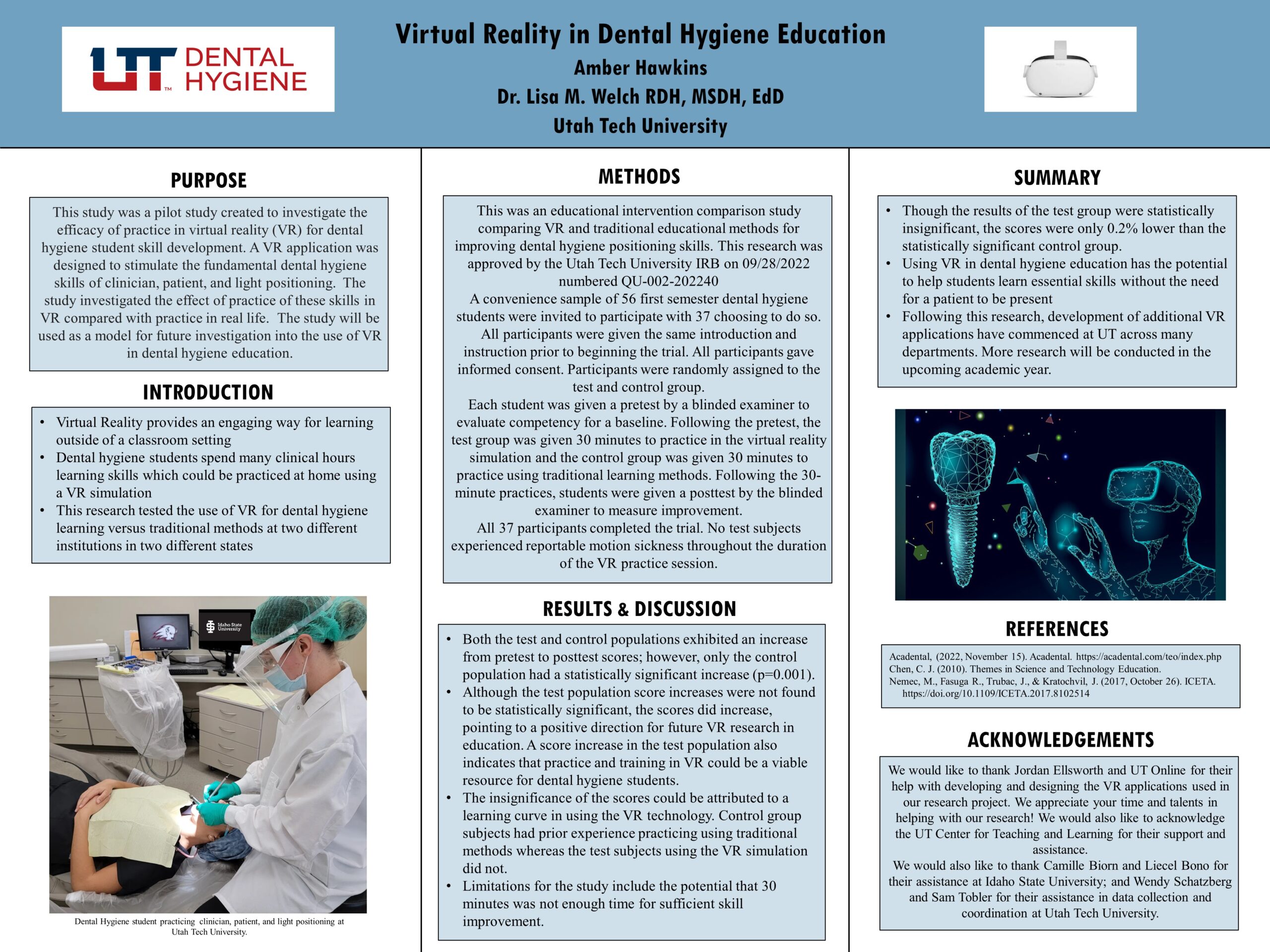Presenter Name: Amber Hawkins
Description
"An Investigation into the Efficacy of Dental Hygiene Skill Practice using a Virtual Reality Application Compared with Traditional Practice Methods"
Purpose: A pilot study to evaluate the efficacy of skill practice in virtual reality (VR) compared with skill practice in real-life, using an application designed to simulate the fundamental dental hygiene skills of operator, patient and light positioning. Methodology: Educational intervention comparison study. Pre/post intervention competency testing performed by a blinded investigator. A convenience sample of 56 first semester dental hygiene students from two institutions in two states were invited to participate. A 66% response rate of 37 participants completed data collection. Participants were pre-tested, randomly assigned to either the test group (VR) or the control group (real life who practiced in a dental operatory using a dentiform), allocated 30 minutes of practice time, then post-tested. Participants were awarded a five-dollar incentive Amazon gift card upon completion of data collection and invited to complete a four-question post data collection survey. Data analysis was conducted using a two-tailed paired t-test with medium effect size of 0.5, alpha of 0.05 and a power of .84 for 37 participants. Survey results were reported using descriptive statistics. Results: Preliminary analysis suggests no significant difference in learning between the control and test populations. However, this may be attributed to methodology limitations; possibly, skill practice for 30 minutes was not enough time to make a distinguishable difference in participant skills. Comprehensive analysis and interpretation of the results are scheduled to be completed December 2022. Conclusion(s): Although no significant difference in learning was observed the research has the potential to lay the foundation for further studies. Currently, dental skills are developed using models in simulation laboratories, with practice on fellow students and ultimately on patients. Virtual reality applications would enable students to practice without the use of expensive dental equipment, in a safe, low stakes environment; ultimately contributing to increased experiential learning and student and patient safety.
Purpose: A pilot study to evaluate the efficacy of skill practice in virtual reality (VR) compared with skill practice in real-life, using an application designed to simulate the fundamental dental hygiene skills of operator, patient and light positioning. Methodology: Educational intervention comparison study. Pre/post intervention competency testing performed by a blinded investigator. A convenience sample of 56 first semester dental hygiene students from two institutions in two states were invited to participate. A 66% response rate of 37 participants completed data collection. Participants were pre-tested, randomly assigned to either the test group (VR) or the control group (real life who practiced in a dental operatory using a dentiform), allocated 30 minutes of practice time, then post-tested. Participants were awarded a five-dollar incentive Amazon gift card upon completion of data collection and invited to complete a four-question post data collection survey. Data analysis was conducted using a two-tailed paired t-test with medium effect size of 0.5, alpha of 0.05 and a power of .84 for 37 participants. Survey results were reported using descriptive statistics. Results: Preliminary analysis suggests no significant difference in learning between the control and test populations. However, this may be attributed to methodology limitations; possibly, skill practice for 30 minutes was not enough time to make a distinguishable difference in participant skills. Comprehensive analysis and interpretation of the results are scheduled to be completed December 2022. Conclusion(s): Although no significant difference in learning was observed the research has the potential to lay the foundation for further studies. Currently, dental skills are developed using models in simulation laboratories, with practice on fellow students and ultimately on patients. Virtual reality applications would enable students to practice without the use of expensive dental equipment, in a safe, low stakes environment; ultimately contributing to increased experiential learning and student and patient safety.
University / Institution: Utah Tech University
Type: Poster
Format: In Person
Presentation #C77
SESSION C (1:45-3:15PM)
Area of Research: Education
Email: d00351262@utahtech.edu
Faculty Mentor: d00351262@utahtech.edu

